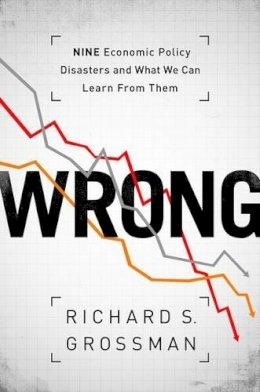26%OFF

Stock image for illustration purposes only - book cover, edition or condition may vary.
Wrong
Richard S. Grossman
€ 30.99
€ 22.91
FREE Delivery in Ireland
Description for Wrong
The industrialized world has long been rocked by economic crises, often caused by policy makers who are guided by ideology rather than cold, hard analysis. WRONG examines the worst economic policy blunders of the last 250 years, providing a valuable guide book for policy makers.. and the citizens who elect them. Num Pages: 296 pages. BIC Classification: KCA; KCX; KCZ. Category: (G) General (US: Trade). Dimension: 150 x 209 x 30. Weight in Grams: 410.
In recent years, the world has been rocked by major economic crises, most notably the devastating collapse of Lehman Brothers, the largest bankruptcy in American history, which triggered the breathtakingly destructive sub-prime disaster. What sparks these vast economic calamities? Why do our economic policy makers fail to protect us from such upheavals? In Wrong, economist Richard Grossman addresses such questions, shining a light on the poor thinking behind nine of the worst economic policy mistakes of the past 200 years, missteps whose outcomes ranged from appalling to tragic. Grossman tells the story behind each misconceived economic move, explaining why the policy was adopted, how it was implemented, and its short- and long-term consequences. In each case, he shows that the main culprits were policy makers who were guided by ideology rather than economics. For instance, Wrong looks at how America's unfounded fear of a centralized monetary authority caused them to reject two central banks, condemning the nation to wave after wave of financial panics. He describes how Britain's blind commitment to free markets, rather than to assisting the starving in Ireland, led to one of the nineteenth century's worst humanitarian tragedies- the Irish famine. And he shows how Britain's reestablishment of the gold standard after World War I, fuelled largely by a desire to recapture its pre-war dominance, helped to turn what would otherwise have been a normal recession into the Great Depression. Grossman also explores the Smoot-Hawley Tariff of 1930, Japan's lost decade of the 1990s, the American subprime crisis, and the present European sovereign debt crisis. Economic policy should be based on cold, hard economic analysis, Grossman concludes, not on an unquestioning commitment to a particular ideology. Wrong shows what happens when this sensible advice is ignored.
Product Details
Publication date
2014
Publisher
Oxford University Press Inc United States
Number of pages
296
Condition
New
Number of Pages
296
Format
Hardback
Place of Publication
New York, United States
ISBN
9780199322190
SKU
V9780199322190
Shipping Time
Usually ships in 4 to 8 working days
Ref
99-1
About Richard S. Grossman
Professor of Economics, Wesleyan University
Reviews for Wrong
a fascinating collection of accounts providing interesting details and new insights.
LSE Review of Books
[Grossman] piques our interest with spicy historical detail...he has written a lovely tour, admirably brief, through centuries of economic folly.
Roger Lowenstein, Wall Street Journal
let's hope that when the next major set of economic policy decisions has to be taken, politicians put aside ruling ideology and pick up a book like this.
Joel Campbell, International Affairs
I have great admiration for this book. Grossman addresses an important question and his judgments are uniformly well reasoned and balanced. He is also an outstanding teacher of economics. ... Few economic historians can write as well as Grossman. But more of those who can write well should follow his example and write for policy makers and for the general public. If not economic historians, then who?
Hugh Rockoff, EH.net
LSE Review of Books
[Grossman] piques our interest with spicy historical detail...he has written a lovely tour, admirably brief, through centuries of economic folly.
Roger Lowenstein, Wall Street Journal
let's hope that when the next major set of economic policy decisions has to be taken, politicians put aside ruling ideology and pick up a book like this.
Joel Campbell, International Affairs
I have great admiration for this book. Grossman addresses an important question and his judgments are uniformly well reasoned and balanced. He is also an outstanding teacher of economics. ... Few economic historians can write as well as Grossman. But more of those who can write well should follow his example and write for policy makers and for the general public. If not economic historians, then who?
Hugh Rockoff, EH.net
